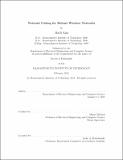| dc.contributor.advisor | Muriel Médard. | en_US |
| dc.contributor.author | Kim, MinJi, Ph. D. Massachusetts Institute of Technology | en_US |
| dc.contributor.other | Massachusetts Institute of Technology. Dept. of Electrical Engineering and Computer Science. | en_US |
| dc.date.accessioned | 2012-07-02T14:19:30Z | |
| dc.date.available | 2012-07-02T14:19:30Z | |
| dc.date.copyright | 2012 | en_US |
| dc.date.issued | 2012 | en_US |
| dc.identifier.uri | http://hdl.handle.net/1721.1/71276 | |
| dc.description | Thesis (Ph. D.)--Massachusetts Institute of Technology, Dept. of Electrical Engineering and Computer Science, 2012. | en_US |
| dc.description | This electronic version was submitted by the student author. The certified thesis is available in the Institute Archives and Special Collections. | en_US |
| dc.description | Cataloged from student submitted PDF version of thesis. | en_US |
| dc.description | Includes bibliographical references (p. 157-167). | en_US |
| dc.description.abstract | Wireless networks and communications promise to allow improved access to services and information, ubiquitous connectivity, and mobility. However, current wireless networks are not well-equipped to meet the high bandwidth and strict delay requirements of future applications. Wireless networks suffer from frequent losses and low throughput. We aim to provide designs for robust wireless networks. This dissertation presents protocols and algorithms that significantly improve wireless network performance and effectively overcome interference, erasures, and attacks. The key idea behind this dissertation is in understanding that wireless networks are fundamentally different from wired networks, and recognizing that directly applying techniques from wired networks to wireless networks limits performance. The key ingredient underlying our algorithms and protocols is network coding. By recognizing the algebraic nature of information, network coding breaks the convention of routing networks, and allows mixing of information in the intermediate nodes and routers. This mixing has been shown to have numerous performance benefits, e.g. increase in throughput and robustness against losses and failures. We present three protocols and algorithms, each using network coding to harness a different characteristic of the wireless medium. We address the problem of interference, erasures, and attacks in wireless networks with the following network coded designs. -- Algebraic NC exploits strategic interference to provide a distributed, randomized code construction for multi-user wireless networks. Network coding framework simplifies the multi-user wireless network model, and allows us to describe the multi-user wireless networks in an algebraic framework. This algebraic framework provides a randomized, distributed code construction, which we show achieves capacity for multicast connections as well as a certain set of non-multicast connections. -- TCP/NC efficiently and reliably delivers data over unreliable lossy wireless networks. TCP, which was designed for reliable transmission over wired networks, often experiences severe performance degradation in wireless networks. TCP/NC combines network coding's erasure correction capabilities with TCP's congestion control mechanism and reliability. We show that TCP/NC achieves significantly higher throughput than TCP in lossy networks; therefore, TCP/NC is well suited for reliable communication in lossy wireless networks. -- Algebraic Watchdog takes advantage of the broadcast nature of wireless networks to provide a secure global self-checking network. Algebraic Watchdog allows nodes to detect malicious behaviors probabilistically, and police their neighbors locally using overheard messages. Unlike traditional detection protocols which are receiver-based, this protocol gives the senders an active role in checking the nodes downstream. We provide a trellis-based inference algorithm and protocol for detection, and analyze its performance. The main contribution of this dissertation is in providing algorithms and designs for robust wireless networks using network coding. We present how network coding can be applied to overcome the challenges of operating in wireless networks. We present both analytical and simulation results to support that network coded designs, if designed with care, can bring forth significant gains, not only in terms of throughput but also in terms of reliability, security, and robustness. | en_US |
| dc.description.statementofresponsibility | by MinJi Kim. | en_US |
| dc.format.extent | 167 p. | en_US |
| dc.language.iso | eng | en_US |
| dc.publisher | Massachusetts Institute of Technology | en_US |
| dc.rights | M.I.T. theses are protected by
copyright. They may be viewed from this source for any purpose, but
reproduction or distribution in any format is prohibited without written
permission. See provided URL for inquiries about permission. | en_US |
| dc.rights.uri | http://dspace.mit.edu/handle/1721.1/7582 | en_US |
| dc.subject | Electrical Engineering and Computer Science. | en_US |
| dc.title | Network coding for robust wireless networks | en_US |
| dc.type | Thesis | en_US |
| dc.description.degree | Ph.D. | en_US |
| dc.contributor.department | Massachusetts Institute of Technology. Department of Electrical Engineering and Computer Science | |
| dc.identifier.oclc | 795561854 | en_US |
